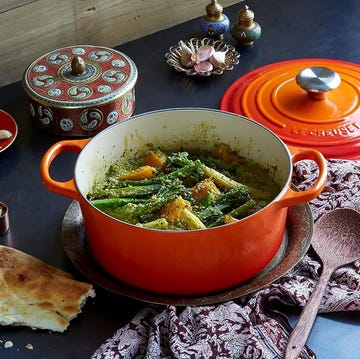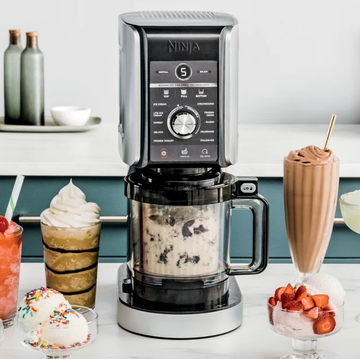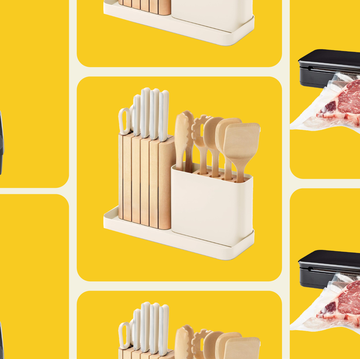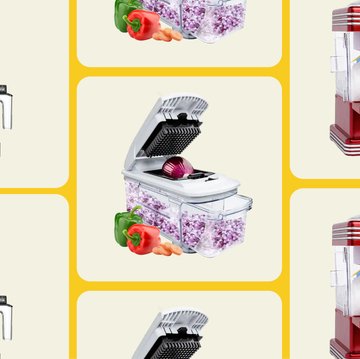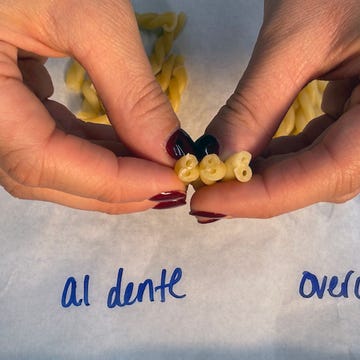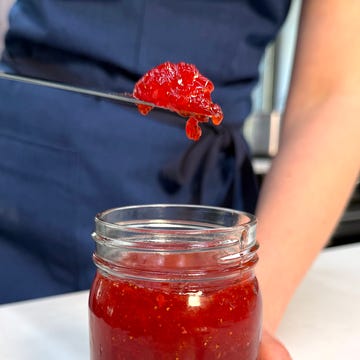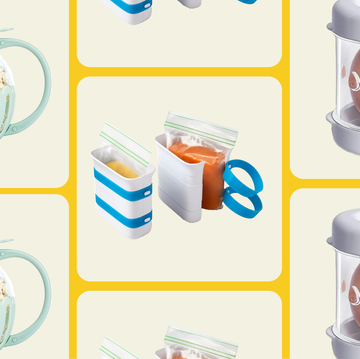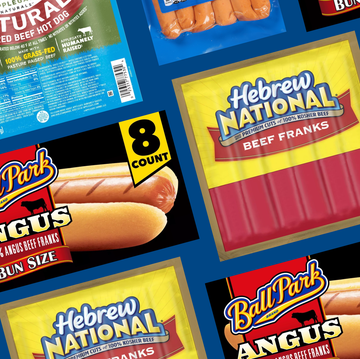1Shop smarter.
 Luis Alvarez//Getty Images
Luis Alvarez//Getty ImagesFood waste starts at the grocery store. Instead of aimlessly wandering the aisles and grabbing what looks good, go to the grocery store armed with a specific list of food you need. Make your list at home, then check your cabinets to make sure you don't already have whatever you need to buy - basically, stay on top of what's in your pantry and fridge. And don't go to the grocery store hungry, since you're more likely to buy items you don't really want or need.
2Plan your meals in advance.
 Nora Carol Photography//Getty Images
Nora Carol Photography//Getty ImagesOne way to stop buying food you don't need is to plan your meals in advance. That way, you know exactly what you need to purchase instead of just guessing. Not only does it prevent you from buying food you're not going to use, but it also makes your life easier during the week. On a Saturday or Sunday, sit down and plan out your meals for the next few days (don't go too far in advance, especially if a lot of fresh produce is involved), and write out a list.
Advertisement - Continue Reading Below
3Shop more often.
 LOUISE BEAUMONT//Getty Images
LOUISE BEAUMONT//Getty ImagesInstead of going to the grocery store once at the beginning of the week and buying a ton of food, try some smaller and faster trips throughout the week. It's not the most convenient option, but think about it: planning meals for the next five days is great, until something inevitably comes up and that plan gets messed up. Then you're left with food sitting there uneaten, and maybe headed to the trashcan. You're better off buying the food you need for the next few days, then heading out again. And if you don't feel comfortable doing lots of smaller trips, you can also use the convenience of apps like Instacart for food deliveries.
4Keep your fridge clean and organized.
 AndreyPopov//Getty Images
AndreyPopov//Getty ImagesHow many times have you wasted food because you simply forgot it was even in your fridge? A clean and organized fridge is one way to always keep your eyes on the food you have (and it will give you peace of mind as well). Invest in some fridge organizers to keep everything neat and tidy, and come up with an organizational system that works for you and your family.
Advertisement - Continue Reading Below
5Stack your fridge strategically.
 Stígur Már Karlsson /Heimsmyndir//Getty Images
Stígur Már Karlsson /Heimsmyndir//Getty ImagesOne thing to keep in mind when organizing your fridge is that it should be stacked strategically. When you come home from the grocery store, move the older food you already had closer to the front, and put the new food in the back. That way, you'll grab the older food first to eat it before it goes bad. You're much less likely to forget about those leftovers if they're not shoved in the back of your fridge.
6Store your food correctly.
 Nomad//Getty Images
Nomad//Getty ImagesThe way you store your food is so important. For example, some fresh produce will last longer if you store it in the fridge, while other pieces will be better on the counter. Look up how to store specific pieces of produce and go from there. This goes for dried goods too. Instead of keeping, say, cereal in a slightly open box where it can easily go stale, dump it into an airtight container so that it lasts much longer (and looks better!).
Advertisement - Continue Reading Below
7Repurpose leftovers.
 BRETT STEVENS//Getty Images
BRETT STEVENS//Getty ImagesLeftovers are a super important part of reducing food waste - there's no reason to throw away leftover pasta that no one ate when you can save it for another meal. But not everyone loves eating the same thing more than once in a short period of time. To keep things interesting, repurpose your leftovers. For example: Saving veggies and chicken from fajita night? Instead of using them for another fajita night, make a rice bowl or even a salad bowl. Get creative!
8Make "kitchen sink" meals.
 Thana Prasongsin//Getty Images
Thana Prasongsin//Getty ImagesDesignate at least one meal a week to be an "everything but the kitchen sink" meal. This just means using up the stuff in your fridge that is probably going to go bad soon that you have no idea what to do with. Ideas include putting fruit in a big smoothie, mixing a ton of veggies together for a giant salad or a bowl of soup, or throwing things onto a roasting pan and roasting them for a random hodgepodge dinner. Again, this is a time to get creative.
Advertisement - Continue Reading Below
9Take note of what you toss each week.
 Peter Dazeley//Getty Images
Peter Dazeley//Getty ImagesStay on top of your food waste habits but keeping track of what you're throwing away. For a few weeks, write down each item of food you're wasting by throwing away unnecessarily. This will help you pick up on patterns you have, like maybe the fact that you tend to always overbuy eggs, or that you keep purchasing kale with the intent to make it, but then don't. It can help you shop smarter in the future.
10Save the scraps.
 deepblue4you//Getty Images
deepblue4you//Getty ImagesVeggie scraps don't need to go in the garbage. Start saving them for various things. Scraps from vegetables like carrots, potatoes, onions, fresh herbs, and peppers can be frozen in a bag and then used to make a big pot of fresh vegetable stock. Scraps of stale bread can be fed to birds outside. Just think about if these items could have another purpose before throwing them away.
Advertisement - Continue Reading Below
11Buy frozen fruits and veggies.
 Westend61//Getty Images
Westend61//Getty ImagesThere's nothing wrong with opting for frozen produce over fresh produce - in some cases, you may not even notice a taste difference. Frozen produce can last months in the freezer, while fresh can only last a few days or weeks. That means that you have much more time to use them before they go bad, so you're less likely to get rid of them.
12Donate the things you’re not using.
 Oscar Wong//Getty Images
Oscar Wong//Getty ImagesIf you notice that you have a lot of food you know you're not going to use any time soon, then consider donating it to people who really do need it. Use the internet to find local food banks to figure out where you can donate your unused goods.
Advertisement - Continue Reading Below
13Start composting.
 Johner Images//Getty Images
Johner Images//Getty ImagesComposting is basically making a bin of food scraps to use outside later on. This organic material can be put in soil to make food grow, which means it could make your garden better and put garbage to much better use. It's also super easy and will barely take any of your time. If you don't have a garden, compost and give the stuff to someone close to you who does.
14Understand expiration dates.
 Beachmite Photography//Getty Images
Beachmite Photography//Getty ImagesExpiration dates on food are confusing. When something says a "best by" or "sell by" date, you may assume that, after that date, you have to throw it out right away or you'll get sick. Actually, though, expiration dates are rarely regulated by the FDA and sometimes don't even really mean anything. Manufacturers use dates to help consumers see when a food is of best quality, but for basically everything aside from infant formula, they aren't totally accurate.
Your best bet is to go by what you smell and see. Do you notice mold growing on something? Definitely don't eat it. It's bad. Are your potatoes green? Toss 'em. Does your milk smell awful? It's no longer good.
Advertisement - Continue Reading Below
15Freeze things.
 Juana Mari Moya//Getty Images
Juana Mari Moya//Getty ImagesFood lasts longer in the freezer than it does in the fridge and is a great way to save a product you won't use in time. If you notice you have a ton of fruit that won't get eaten, cut it up, put it in bags, and freeze it for later use. Same goes with vegetables, bread, meats, fresh herbs, and more. Add a date to the bag so you know exactly how old it is.
16Get airtight containers.
 Claudia Totir//Getty Images
Claudia Totir//Getty ImagesWhen storing food, you want to make sure you're storing it correctly - if not, your leftovers could go bad before they should. Invest in a good set of airtight containers that will keep food at its best for a longer amount of time.
Advertisement - Continue Reading Below
17Start canning and pickling.
 Jeffrey Coolidge//Getty Images
Jeffrey Coolidge//Getty ImagesCanning and pickling is another way to extend their life. Look up what you can pickle - it's a ton of fresh vegetables, and it's super easy. It's also more interesting to eat and can add a lot to your meals.
18Serve smaller portions.
 Didier Gabiam / EyeEm//Getty Images
Didier Gabiam / EyeEm//Getty ImagesWhen serving food to yourself or your family, opt for smaller portions rather than something large. Most of us are eating huge portions that we don't finish, and then the leftovers are going in the garbage. You're better off serving a smaller portion - people can always go back for seconds.
Advertisement - Continue Reading Below
Advertisement - Continue Reading Below
Advertisement - Continue Reading Below


